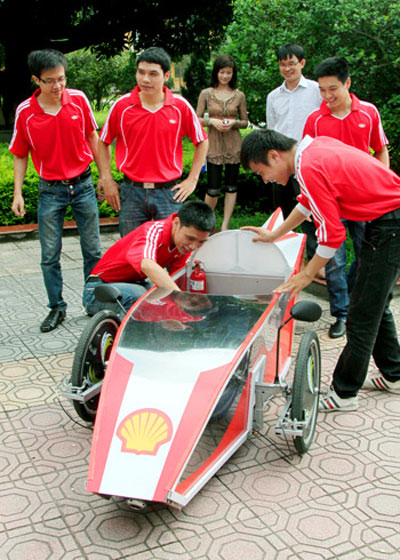Students make their own cars to save energy
Design, then mount the engine, make the chassis and the automobile jacket cover also manipulated by the students themselves. After several months, 3 Vietnamese cars were completed and ready to participate in the fuel-saving race with the countries.
For many months, with the guidance of teachers, students of Ho Chi Minh City Polytechnic University, Hanoi Polytechnic and Hanoi University of Technology have completed 3 homemade cars to participate in the Shell Eco race. -marathon Asia in Malaysia from July 6 to July 9.
For many years the Shell Eco-marathon race for homemade cars is a playground for students from different countries to find the most energy efficient vehicle. Whichever runs the farthest distance with 1 liter of fuel will be the winning car. Last year Thailand was the champion team with a record of 1,521.9 km.
Losing the opportunity to attend last year due to lack of funding, this year Vietnamese teams put a lot of determination. The Team 07 of Ho Chi Minh City Polytechnic University spent six months in a hurry, students collected tuition fees to create their products.

A homemade car of the Vietnamese team. Photo: Shell provided
" On the day of completion of the car, the team has almost no money in the bag, we often work until late and start in the early morning, the first 2 months are only for the design to overcome the qualifier due to the team. regulations " , student Nguyen Ngoc Trung said.
In terms of engines, group 07 uses 35 cc capacity, 1.3 horsepower capacity, then builds more problems, design new gear ratio between engine and wheel, maximum friction reduction, car cover Made of lightweight composite material. The car is 3m longer, 80 cm wide and can reach speeds of 35 km / h.
According to Mr. Nguyen Ngoc Dung, researcher - Lecturer of Department of Motive and Motor Vehicle of Ho Chi Minh City University of Technology , this self-made car will try to run more than 320 km per liter of gasoline, but all depends a lot. Other factors such as track surface, wind speed, driving skills .
' There is a need for a variety of fuels and techniques to meet the rapid increase in transportation demand but still limit CO 2 emissions. Only improving new technology helps develop smarter products. The purpose of the competition is to encourage future scientists and engineers to think creatively about fuel efficiency and put ideas into practice, 'said Thanh Le, Shell Vietnam's General Manager.
Associate Professor Ta Duc Thinh, Director of Science, Technology and Environment, Ministry of Education and Training, said: ' The competition is an opportunity for students to create and apply advanced technology for energy use. most effective, and research into the use of new fuels. Most importantly, educating the sense of responsibility when using energy and reducing CO 2 emissions protects the environment '.
- Students make an electric car that runs 900km on a single charge
- Students who make cars can run nearly 3,000 km with a liter of gasoline
- Students making 'cars' help people with disabilities move freely
- Dutch students make electric cars from sugar beets
- Close up of the first homemade solar car of Palestinian students
- Students make electric cars
- 6 breakthrough energy technologies can change the world
- New generation super energy vehicles
- Students manufacturing gasoline-electric vehicles
- Thua Thien-Hue: Grade 9 students build electric cars
- The way to create energy for cars
- Students of one of the world's poorest countries invented a way to start cars with fingerprints
 Vietnam 5th Asian champion on fuel-efficient vehicles
Vietnam 5th Asian champion on fuel-efficient vehicles We can read all NASA studies completely free of charge
We can read all NASA studies completely free of charge Singer and songwriter Bob Dylan won the 2016 Nobel Prize for Literature
Singer and songwriter Bob Dylan won the 2016 Nobel Prize for Literature Scientific revolution in Asia
Scientific revolution in Asia The land that specializes in 'swallowing' cars in China: Many people have to sadly leave their cars behind, even if they are given money, no one will come to take them back
The land that specializes in 'swallowing' cars in China: Many people have to sadly leave their cars behind, even if they are given money, no one will come to take them back  Igloo Effect Saves Man's Life Trapped for 60 Days
Igloo Effect Saves Man's Life Trapped for 60 Days  The Forgotten History of New York's First Electric Taxis
The Forgotten History of New York's First Electric Taxis  Why are European car horns honked louder than Asian ones?
Why are European car horns honked louder than Asian ones?  Equip yourself with 5 skills to escape in the nick of time when your car falls into water.
Equip yourself with 5 skills to escape in the nick of time when your car falls into water.  Teach children 3 ways to escape if left in a car
Teach children 3 ways to escape if left in a car 